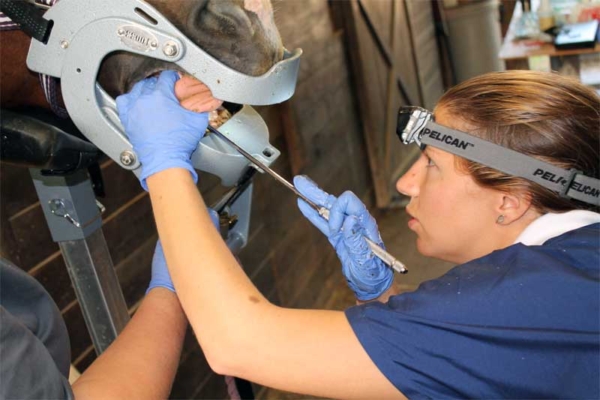As time — and the coronavirus crisis — goes on, we’re starting to see small glimmers of hope for a cure, and an end. And several of these flashes come thanks to women innovators.
Female scientists and founders have been making strides on vaccines, testing kits, infectious disease prevention and more, to the benefit of, well, everyone. This work couldn’t be more critical — as of publication, just under 1.4 million cases of Covid-19 had been reported in the United States alone.
[Related: A Sewing School Goes Live on Instagram, Making Masks]
So today, we’re spotlighting nine women who are making a difference on the front lines of fighting a global pandemic.
1. Kizzmekia Corbett

Corbett is heading the search for a coronavirus vaccine at the National Institutes of Health. But in addition to that work, she also drew national attention for calling out the lack of diversity on President Donald Trump’s coronavirus task force. “The task force is largely people (white men) he appointed to their positions as director of blah blah institute,” she tweeted in February. “They are indebted to serve him NOT the people.” Representation in the fight for a cure is critical, she has also publicly noted, as the virus is disproportionately harming people of color.
2. Buffy Lloyd-Krejci

Buffy Lloyd-Krejci started IPCWell, an infection prevention consulting firm in Scottsdale, Arizona, right before the coronavirus outbreak hit the United States. “I couldn’t believe the number of people who were suffering from infections that could potentially be prevented,” she says — a concern that countless others now share., Lloyd-Krejci does “deep dive assessments” of facilities like nursing homes to make sure medical specialists are using hand sanitizer, following environmental laundry and food safety protocols, and are properly putting on and removing equipment without contaminating themselves.
3. Sarah Gilbert

Gilbert, a UK-based scientist, is working around the clock with her team to find a vaccine for Covid-19 by fall. She’s the co-founder of Vaccitech and a professor of Vaccinology at the University of Oxford, and she has been charged with overseeing a promising effort to rapidly develop a vaccine. Her team, hailing from the renowned Jenner Institute, was awarded a £2.2 million grant from the UK’s National Institute for Health Research and the UK Research and Innovation in March to conduct preclinical and clinical trials. “The best-case scenario is that by the autumn of 2020, we have … the ability to manufacture large amounts of the vaccine,” she said.
4. Minal Dakhave Bhosale

Novel coronavirus testing kits hit markets in India earlier this year thanks to virologist Dakhave Bhosale. She is said to have led a team at Mylab Discover in Pune to success in developing an effective testing kit, making hers the first Indian lab to receive approval to both make and sell them. Creating these tests was critical for closing India’s coronavirus testing gap — and she accomplished the feat mere hours before having a baby. “It was an emergency, so I took this on as a challenge. I have to serve my nation,” she said.
[Related: Women Entrepreneurs — Need Legal Guidance? This Nonprofit Can Help]
5. Jung Eun-kyeong

Eun-kyeong is the chief of the Centers for Disease Control in South Korea, a nation that had been lauded for its response to the coronavirus. Officials like Eun-kyeong emphasized testing and tracing over lockdowns early on, with positive results. And now, as the east Asian country is seeing a new surge in Covid-19 cases — most of them tied to outings at night clubs in Seoul — people are turning to Eun-kyeong for more information and guidance.
6. Dr. Marylyn Addo

Addo is another woman working hard for a Covid-19 vaccine. She’s the head of the Department of Internal Medicine’s Division of Infectious Diseases at the University of Hamburg, Germany. The entirety of Addo’s career has been focused on fighting infectious diseases, having done critical work to mitigate threats like the Ebola virus, as well as a different strain of the coronavirus. Now, however, she’s laser-focused on combating Covid-19.
7. Apryle Horbal

Horbal is the founder of a company called VetNow, which offers telemedicine services for pet owners. “Veterinarians see a lot more in terms of strange infectious diseases in animals that don’t have vaccines and that we don’t know how they got there,” Horbal told Fast Company. So, VetNow is teaming up with the Smithsonian National Zoo and Conservation Biology Institute to develop a database of animal-borne diseases like Covid-19 to the 1918 Spanish flu. The hope is that this information will increase the chances of detecting threats early.
8 & 9. Suzan Murray and Dawn Zimmerman
Murray and Zimmerman are two researchers at the Smithsonian. Murray, who heads its Global Health Program, and Zimmerman, who leads some of its virus sampling expeditions, are looking at ways in which “ a growing human population encroaching on the natural habitat” of animals and other factors could lead to a viral spillover from them to humans. Then, “our team of virologists use the samples collected in the field to determine which viruses are most likely to spill over to humans,” Murray explained to CNN.
[Related: This Cat DNA Company Says Pandemic Sales Are Up. Really]

